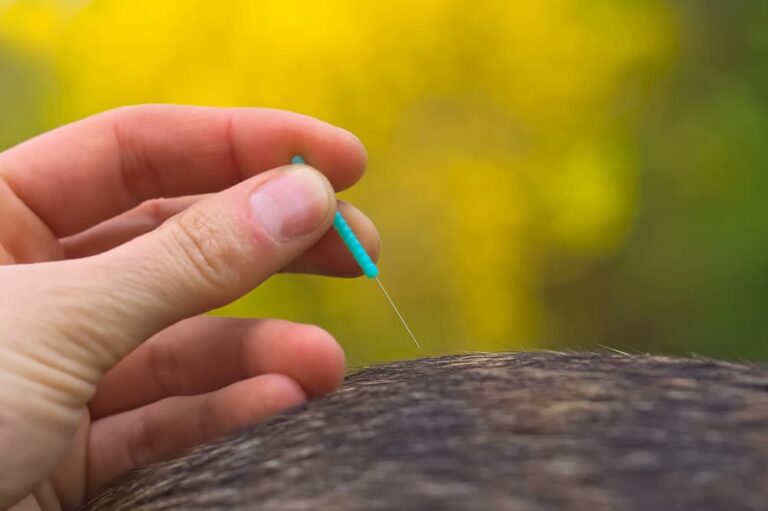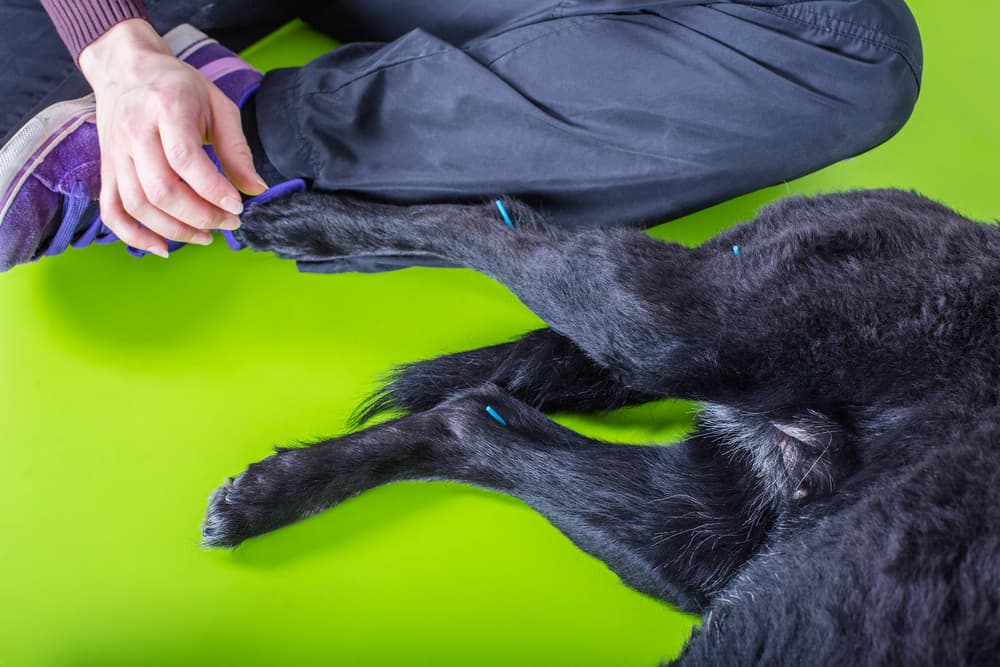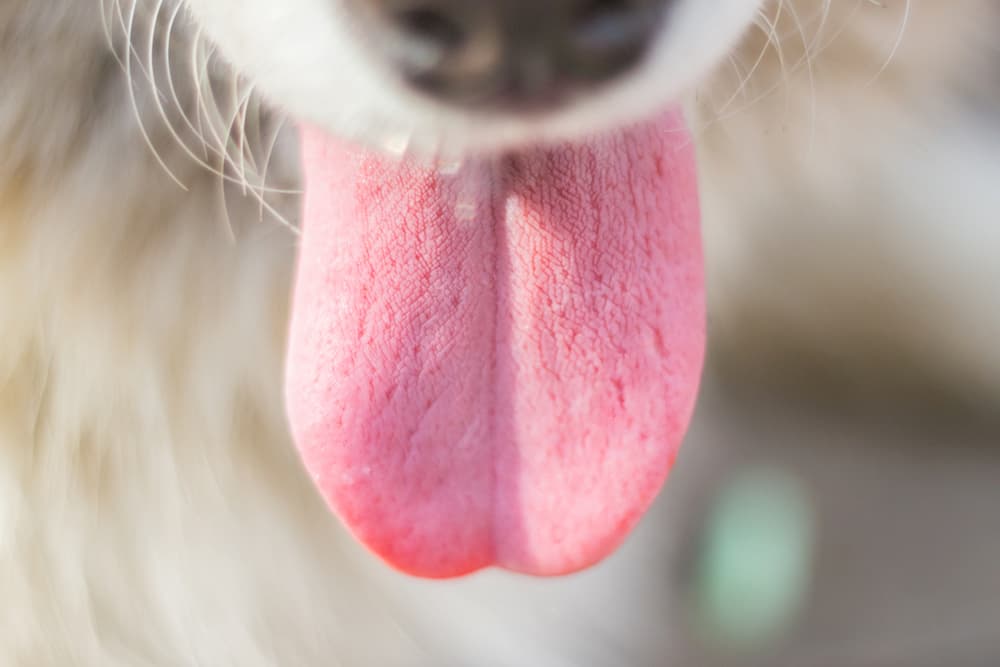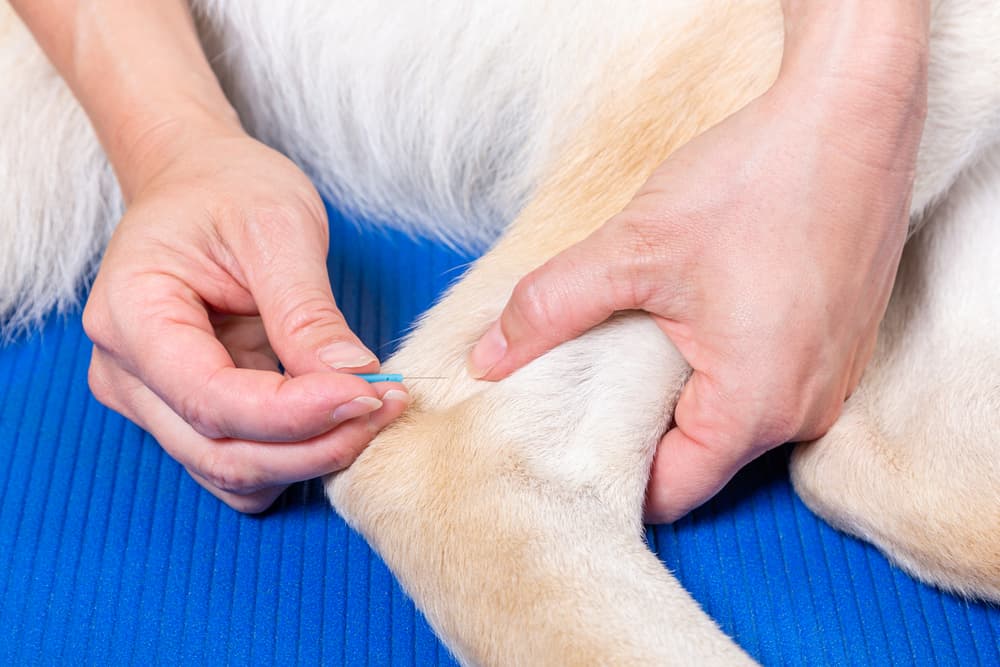Acupuncture for Dogs

Picture this—a comfortable pooch contentedly curled up, almost asleep. Easy to imagine, right? What if we told you that this pooch was receiving an acupuncture treatment? While you might be surprised to find out that most dogs react this way to acupuncture, it’s true. Read on to find out more about acupuncture for your canine companion.
What Is Acupuncture?
Acupuncture is part of a system called Traditional Chinese Veterinary Medicine or TCVM. TCVM includes five modalities, often referred to as five branches:
- Acupuncture
- Chinese Herbal Medication
- Chinese Food Therapy
- Manipulation called Tui-Na (includes massage over acupuncture points)
- Meditation-like practice including Tai Chi and Chi Gong
Acupuncture is believed to help regulate pain pathways and pain-related brain networks (1).
Despite the long-standing debate over whether acupuncture channels really exist, evidence has recently been discovered in the field of neuroembryology (2, 3, 4). This branch of medicine is the study of the development of the nervous system prior to birth.
Benefits of Acupuncture for Dogs

While acupuncture may be most commonly associated with treating musculoskeletal issues like arthritis, this modality may also be useful for a myriad of pet health issues, including anxiety and other behavior issues, breathing issues like asthma, dental problems, heart disease, eye and ear issues, liver disease, kidney disease, nausea, and other digestive problems. It can also be very useful as part of a pain management or comfort care plan and can help stimulate appetite.
Acupuncture can also be used to help proactively keep your pet healthy. It can modulate and balance the immune system, helping to prevent allergies and infections.
Most dogs are good candidates for acupuncture. If your dog is able to sit or lie down for at least 10 minutes and they are generally well-behaved (not aggressive or fractious), they are a good acupuncture candidate. If not, they may still be a candidate for laser acupuncture (laser therapy over acupuncture points without any needles) or aquapuncture (injection of vitamins or other substances into acupuncture points).
Dog Acupuncture Appointment: What to Expect
Did you know that acupuncture can be performed easily by a certified veterinary acupuncturist (CVA) at an animal hospital or by a mobile veterinarian in the comfort of your pet’s home environment? Like massage and laser therapy, it tends to have a calming effect on the body. Pets may even fall asleep during or after an acupuncture session.
First, your veterinary acupuncturist will review your dog’s medical records. Next, they’ll probably have some questions for you so that they can understand what issues you’d like to address with acupuncture. They will want to know about your dog’s personality, diet, medications, supplements, and environment. Then, they’ll perform an examination.
In addition to a standard physical examination, the TCVM system uses the tongue and pulses to provide clues to overall health. For example, a dark pink tongue and fast, forceful pulses in a dog with smelly ears and skin would indicate a TCVM diagnosis of Damp Heat. Instead of clearing the dampness and heat with antimicrobial and anti-inflammatory medications, a veterinary acupuncturist chooses acupuncture points to accomplish this. The number and location of acupuncture points are carefully selected to create an “acupuncture point prescription.”

Acupuncture sessions typically last between 10-30 minutes, depending on the type of acupuncture your pet receives. Generally, at least 4-6 initial treatments are recommended. After that, the frequency of the sessions depends on the nature of your pet’s health issues. For chronic conditions, most pets will need acupuncture every 1-3 months on a long-term basis.
Side Effects and Risks of Acupuncture for Dogs
Side effects of acupuncture for dogs are rare. Pets may be sleepy for a few hours after acupuncture sessions. It is possible for pets to experience mild bleeding on needle insertion or bruising at an acupuncture site, although these types of events are uncommon.
It is not recommended to place acupuncture needles in or near a mass because that could increase local blood flow and make it grow faster. If there’s a chance that your pet is pregnant, alert your acupuncturist, so that they can avoid using acupuncture points that could damage the fetus.
Cost of Acupuncture for Dogs
The cost of acupuncture for dogs is approximately $50–$100 per session. Ask about purchasing an acupuncture package in advance, which might include 3 or more sessions with a discount.
The exact cost will depend on your pet’s condition, as well as the frequency and number of acupuncture sessions. For chronic conditions like osteoarthritis, many dogs receive acupuncture regularly on a long-term basis.
The five branches of TCVM complement each other and are often used together. The overall treatment cost will depend on whether acupuncture is being used alone or as part of a multimodal approach (acupuncture used alongside other therapies like conventional medication or Chinese herbal medication).
How to Know If Acupuncture Is Right for Your Dog

While acupuncture may be beneficial for a variety of health issues in dogs, only your veterinarian can tell for certain if it may be right for your dog. If your veterinarian does not include acupuncture in a treatment plan for your dog or doesn’t perform acupuncture, don’t be afraid to ask about it.
Like any therapeutic regimen, it may take several sessions to know how much benefit your dog is receiving from acupuncture. Your dog should be periodically re-evaluated to assess their progress.
How Can I Find Out More?
To find a veterinary acupuncturist, check with your local veterinarian, or search the American Holistic Veterinary Medical Association database.
If you’d like to know more about acupuncture for pets, there are some great references, including the book Four Paws Five Directions written by holistic veterinarian Dr. Cheryl Schwartz.
References
- Liu L, Tian T, Li X, et al. Revealing the Neural Mechanism Underlying the Effects of Acupuncture on Migraine: A Systematic Review. Front Neurosci. 2021 May 20;15:674852. doi: 10.3389/fnins.2021.674852. PMID: 34093119; PMCID: PMC8172773.
- Dorsher PT. Neuroembryology of the acupuncture principal meridians: Part 1. The extremities. Med Acupunct. 2017;29(1):10–19
- Dorsher PT. Neuroembryology of the acupuncture principal meridians: Part 2. The trunk. Med Acupunct. 2017;29(2):77–86
- Dorsher PT, Chiang P. Neuroembryology of the Acupuncture Principal Meridians: Part 3. The Head and Neck. Med Acupunct. 2018 Apr 1;30(2):80-88. doi: 10.1089/acu.2018.1271. PMID: 29682148; PMCID: PMC5908427).









